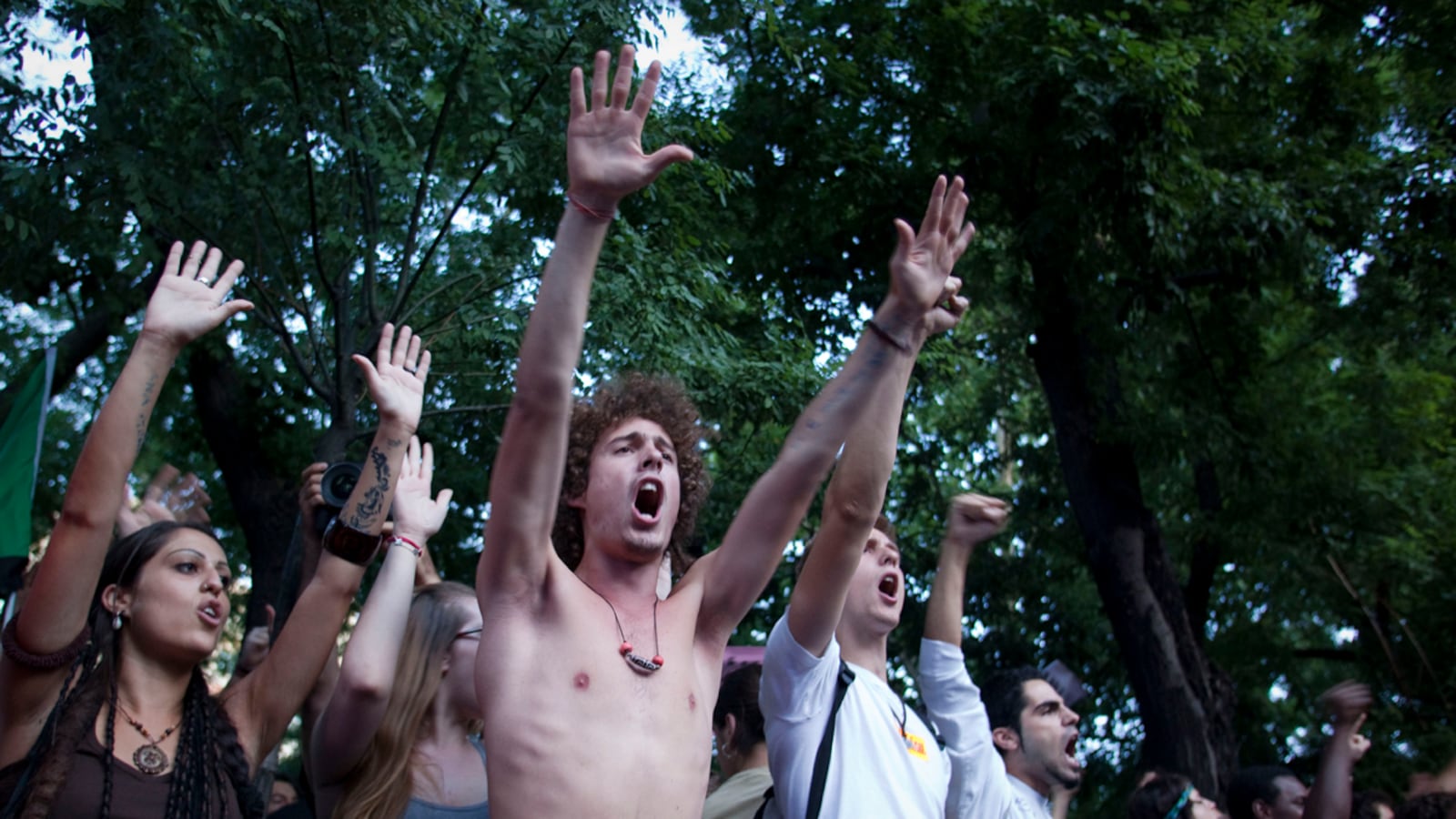How can the world avoid an explosion of youth protests in the coming years when we are already experiencing an epidemic of youth unemployment today? And how can our generation—who fared better than our parents—begin to understand what it feels like for the coming generation who already fear they will do worse?
The global arithmetic of youth unemployment makes for frightening reading: the 81 million young people who are today out of work now make up the majority of the world's unemployed. Young people are two-and-a-half-times more likely to be out of work than their adult counterparts. Youth unemployment has now reached a staggering 50 percent in Egypt and Tunisia, has risen above 40 percent in Spain and Italy, and is approaching similar figures in Africa. Even oil-rich Saudi Arabia is suffering its worst ever rise in joblessness among young people. Across the West, in both America and Europe, official youth unemployment rates already exceed 20 percent. Another 350 million will be added to the global workforce by 2020.
What the world is facing, in short, is an unprecedented crisis among young people without employment and without the hope of employment. The global downturn means not only that the availability of jobs is in free fall, but the potential for new job creation is declining, too. In the West, the service sector—which used to create 90 percent of new jobs—is barely growing, and the export sectors, which are growing, do not create anything like enough jobs to make up the massive shortfall.
So in the coming decade, an astonishing one and a quarter billion young people (1,250,000,000) are likely to experience a period of unemployment after they leave education. And in many parts of the world, young people who manage to find work discover that it does not lift them out of poverty: 150 million young people are today earning less than 10 dollars a week.
We know historically that the costs of being part of a lost generation are very high indeed: a person's lifetime prospects can be irrevocably scarred when they are unable to find that first job. They enter the occupational ladder on its lowest rungs and often never catch up. Overall earnings across their lifetime are usually reduced. Young people speak of the effects of unemployment shadowing them even after they find work, having fundamentally damaged their confidence and self-belief.
Nor does the world seem to care very much that its young workforce has been left idle. In the current global downturn, it is young people whose needs are most neglected in the distribution of resources. Countries spend far more national income on their adult populations, particularly on health care (10 percent across advanced countries), and pensions (around 5 percent overall). Only 4.4 percent of global income is spent on education and a fraction of that on youth employment, investment in opportunity neglected at the expense of spending on security. To downgrade education is not only socially divisive but bad economics: if the young continue to be overlooked, deprived of education, training, and work, the whole future of welfare spending will itself be at risk, with young people unable to contribute toward the health care and pensions of their elders.

It is no wonder, therefore, that armies of young people have been protesting across the world. They have demonstrated from Tunisia to Thailand, from Puerto del Sol to Madrid. They have taken to the streets of Spain in the thousands, calling themselves The Indignant Ones. Their marching cry is always the same, no matter what their language: that the people who caused the global crisis have not suffered, while the people who did not cause it have.
They feel not only frustrated with their lives today but—far worse—a sense of despair about their lives tomorrow. In the 2011 World Development Report, two thirds of young men identified unemployment and social injustice as the major cause of joining gangs and rebel groups.
The next logical development from these protests will be the growth of distinctive youth movements, born outside traditional political parties and trades unions, spurred on by social networking. They are likely to link across the world, formally organize, and become more influential than traditional movements where young and old in individual countries are bound together over national concerns. If this happens, the world's young people will become increasingly disconnected from other generations. They will feel more in common with each other than with their own immediate neighbors, more attuned to those sharing their plight on other continents than they are to their own communities and nations.
At the heart of the protests by young people is a feeling not just that they are suffering but that their suffering is being ignored. Recall a speech made 20 years ago at the World Economic Summit in Rio by a 12-year-old girl, Severn Cullis-Suzuki. She became “the girl who silenced the world’s adults for six minutes” as she vividly described a generation gap in our understanding of the world. She became an Internet sensation because she captured perfectly the feeling, which so many young people have, that they are powerless in a world where adults, paying lip service to young people’s problems, still make the decisions that matter and where the young are ordered to adhere to a moral compass that adults themselves ignore.
"You teach us how to behave in the world," Severn told her audience. "You teach us not to fight with others; to work things out; to respect others; to clean up our mess; not to hurt other creatures; to share, not be greedy. Then why do you go out and do the things you tell us not to do?"
Today Severn's message chimes powerfully with young people who feel pitted against a global economy in which adults protect the interests of the few at the expense of the many. But today, as the battle over who gets what from welfare spending intensifies, the gap between the generations is more than just a gap in understanding, but a battle of conflicting interests. Hope for the world's 81 million young unemployed must come through action.
Individual nations have done it before—the New Deal of the '30s put America back to work, and the Marshall Plan of the '40s created millions of new jobs in Europe. We need this same boldness now with the members of the G20 agreeing on a growth and jobs plan on a global scale—America and Europe exporting more, China and Asia consuming more, each contributing a self-reinforcing cycle of rising demand. And the global growth pact should include not only a new Middle East Development Bank financed by the four richest oil states to address discontent in that region but investment banks in America and across Europe sponsoring job-creating low-carbon and renewable technologies.
Severn Cullis-Suzuki concluded her speech with a maxim that rejected the empty promises of the world's adults. "My father always says that you are what you do," she announced, "not what you say." Severn was right then and she is right now. It is time for the world to act.
Former British prime minister Brown is the author of Beyond the Crash: Overcoming the First Crisis of Globalization.




